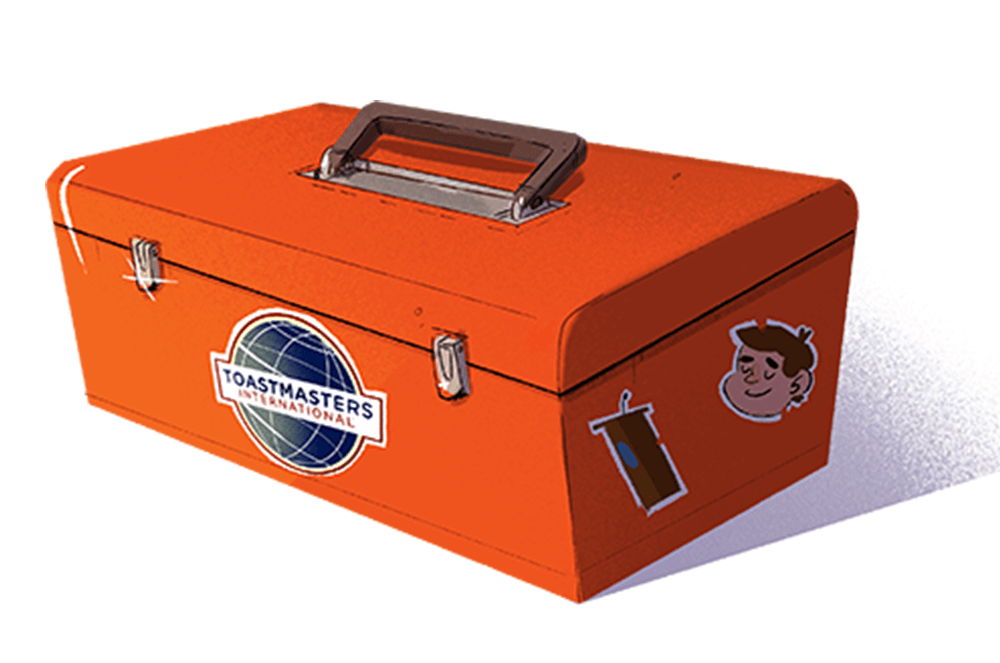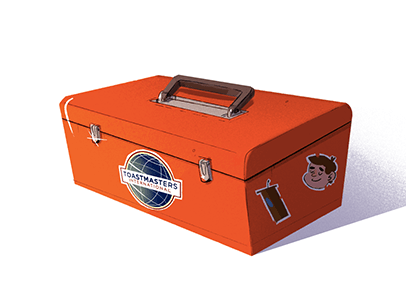
Writing skills and speaking skills are different. Crafting an article is different from giving a presentation. But the disciplines I have learned from writing these Toolbox articles have helped me better hone my speaking skills. Perhaps they can help you as well.
First of all, don’t wait until the last minute to start. I began my first draft of this article two weeks out from my deadline. That gave me time to do the editing that I desperately needed.
By my fourth major edit, I scrapped three whole paragraphs. Sometimes major edits are needed.
Procrastination, in my observation, is a habit of many Toastmasters. It was for me when I first started. And, in spite of good intentions (and lessons learned), I sometimes still find myself scrambling to put together a speech a day or two before my scheduled speaking slot.
And that often results in a message that is not as coherent as it could be. Your first draft is frequently a “stream of consciousness” presentation. Especially if you don’t have a plan. Without one, your thoughts can easily wander.
In fact, as you start your writing, your first task is to figure out what you want to say. What is your overall message in one sentence? And what are your main points? That not only will keep you on track, but it will also make your writing go that much quicker.
A second lesson has to do with word count. I have a limit of 750 words. When I write my first draft, it usually comes in at 900 words. This one came in at 903. That requires some heavy editing (and sometimes serious surgery). That is why starting early is important.
When I first started in Toastmasters, my speeches during my practice sessions came in at nine minutes. My solution? Talk faster. Yes, you do have that option during a speech, but your communication suffers significantly with that strategy.
As you start your writing, your first task is to figure out what you want to say.
Resist the temptation to rush your speeches. Talk normally and edit your speech to fit within the seven-minute limit. You will have a tighter, more effective message. The spoken word gives us the ability to add emphasis and emotion to our communication through vocal variety. Rushing severely limits this.
The third lesson is to keep it simple to understand. This can take many forms. The Toastmaster magazine is read by members in over 100 countries. If I use uncommon words or buzzwords, many readers might not understand what I am saying. That trains me to write with my readers in mind. Focus on your listeners and you will do well.
Another aspect of keeping it simple is to continue editing until the words sound right. They should flow easily out of your mouth. When we speak without adequate practice, we all too frequently stumble over our words. This might be caused by a lack of familiarity with what we want to say. Or, perhaps, we accidentally created a tongue-twister that invariably trips us up at the worst possible time.
If our wording is too complicated, we may also create a mind-twister for our audience members. If they have to think too much about the individual words and phrases that we use, they don’t have enough time or mental focus to think about our overall message. That is why I scrapped those three paragraphs in my fourth major edit. They complicated my message.
Reading your speech through once or twice is probably not enough. I find that, as I read an article I’ve written 10 or 11 times, I find problems that I hadn’t seen before. Why did I just now see it? I had put the article down and come back to it later. Sometimes the next day. That is another reason why starting early is important. You have the luxury of coming back to it, sometimes many times, and testing the flow. It is as if you are hearing it as your audience will hear it, and that is the best perspective of all.
As I said, I have found that my articles have helped me become a better speechwriter and speaker. And these lessons can help you as well. So start early on your next speaking project. Take the time to edit. And take the time to make it something that is easy to present and easy for your audience members to follow. That will be time well spent.
Bill Brown, DTM is a speech delivery coach in Gillette, Wyoming. He is a member of Energy Capital Toastmasters in Gillette. Learn more at billbrownspeechcoach.com.



 Previous
Previous

 Previous Article
Previous Article
